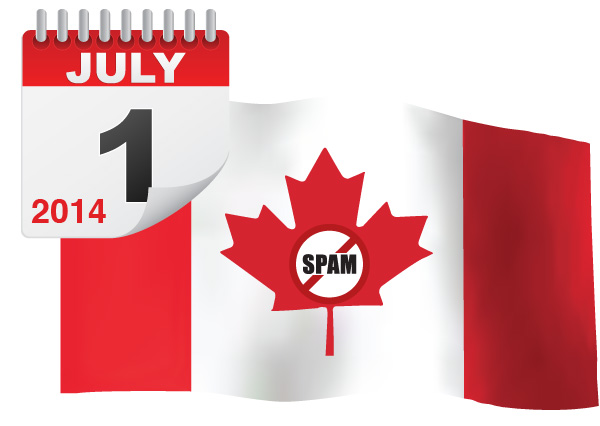
After a frustrating path to reality, it appears that the Canadian Anti Spam Law (CASL) is ready to be put into action. The law, which garnered a great deal of attention when it was first passed into legislation in 2010, has also drawn a great deal of criticism. Some of that criticism has been out of pure frustration, as the government of Canada dragged its feet through a mire of what felt like quicksand. Public consultations over something that was already penned and planned seemed to verify the truth behind the other source of criticism: that Canada was all talk and no action, caving to pressure from corporate stakeholders and marketing firms that didn’t like the idea of paying stiff fines for being caught with their pants down.
And those corporations and marketers have a right to be terrified. The law, if enacted, has the ability to be a bone crusher. It’s been heralded as the toughest spam law in the world, with staggering fines threatened against violators. Which, of course, is why the corporations tried to head the thing off at the pass. Indeed, the law itself has undergone modifications during the process that threatened to see the law disappear altogether. But now, it appears that the Canadian law will be put into action beginning July 1 of this year, so with trepidation, while we can’t fully exhale yet, we can take a look at how it might affect spammers when it arrives.
Marketers are freaking out now, and they should be. But not all marketers are created equal and it was inevitable that some were going to get caught up in the Tsunami and muddy the distinction between justice and draconian practice. As CBC News points out, charitable organizations might be in for a rough ride when the law goes live.
The law requires emailers to have consent before sending off those mass mailings, and to include unsubscribe features in all messages. Now, that sounds straightforward enough, but when you think about the massive databases of emails that marketers use to message us, consider what percentage are actually users who’ve granted explicit permission, and what percentage are skimmed from banks, insurance companies, email resellers, and so-on.
Now we begin to see the problem. If marketers are forced to be honest…well, we won’t suggest that it’ll be full-on Armageddon, but you might want to stock up on water and flashlight batteries, just in case. Kathy Taylor, spokesperson for the Ontario Nonprofit Network, points out that “it will make things more difficult. It is complex, it adds a level of complexity to an administrative burden for non-profits and charities and especially for the ones that have few paid staff or no paid staff.”
Charities have a hard time finding donations each year. Unless you’re an A-list name like cancer or heart disease, fundraising can be tough. But does that mean that they should be permitted to display bad behavior? It’s a difficult question, because on the one hand, you feel for charities and the inherent difficulty of their mandates. Nobody wants to see a valid charity suffer or fail. But on the other hand, why are we talking about this at all? Because spam is bad. Simply put.
Taylor notes that some charities will be exempt for some of their fundraising activities, but that most other organizations will have to make changes if they want to be compliant with the new law. “We did some advocacy on this issue in the initial stages and we really hoped that the non-profit and the charitable sector would be exempt from these regulations because it was really designed for businesses in terms of their anti-spam, not for the community work that non-profits and charities do.”
The ONN has several points they want charities to know about the new law:
- Legislation covers “commercial” electronic messages only. So if no transaction is involved, CASL doesn’t apply
- Fundraising emails from charities are exempt
- Other revenue-generating activities by nonprofits and charities are not exempt
- Legislation will be proclaimed on July 1, 2014 (but organizations will have 3 years to get permission where required)
- Commercial electronic messages must have an unsubscribe function
- Commercial electronic messages must clearly identify the organization
- If people signed up for your newsletter directly, it’s ok to continue communicating with them
- You’ll need permission before you can add people to other lists (like adding program graduates to your general newsletter list)
- Day-to-day communications are exempt, so most routine work/ activity emails to other organizations or to volunteers are ok
- ONN will be hosting webinars on anti-spam in 2014 to help nonprofits understand changes and obligations
As honorable as the charity work is, should that guarantee a golden ticket to spam people? Again, it’s a tough proposition and not an easy question to answer.
